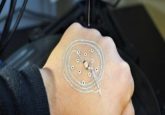Could your next tattoo be diagnostic?

A new type of implantable, diagnostic ‘invisible tattoo’ has been developed, which could realize the reality of a long-lasting, medical sensor. The new sensor was developed by researchers at Johannes Gutenberg University Mainz (JGU; Germany), and comprises gold nanoparticles (aka, ‘nanogold’) embedded into an artificial polymeric tissue that can be implanted under the skin, and reports on drug concentrations through changing its color. Previously, the idea of implantable diagnostic sensors has been thwarted by the need for regular replacement owing to the body’s rejection of the implant, or the sensor’s color changing abilities fading over time. The team, led by...
To view this content, please register now for access
Join our member community for FREE to access a collection of journal and online-only features, including:
- Exclusive access to educational videos, eBooks and insights into top BioTechniques journal articles
- The latest news and journal updates delivered straight to your inbox when you want it
- Personalized recommendations for the latest member-exclusive podcasts, interviews and expert opinions
- Priority registration to webinars, panel discussions and events
- Access to competitions and journal publication discounts, including 10% off open access fees when you sign up today!





